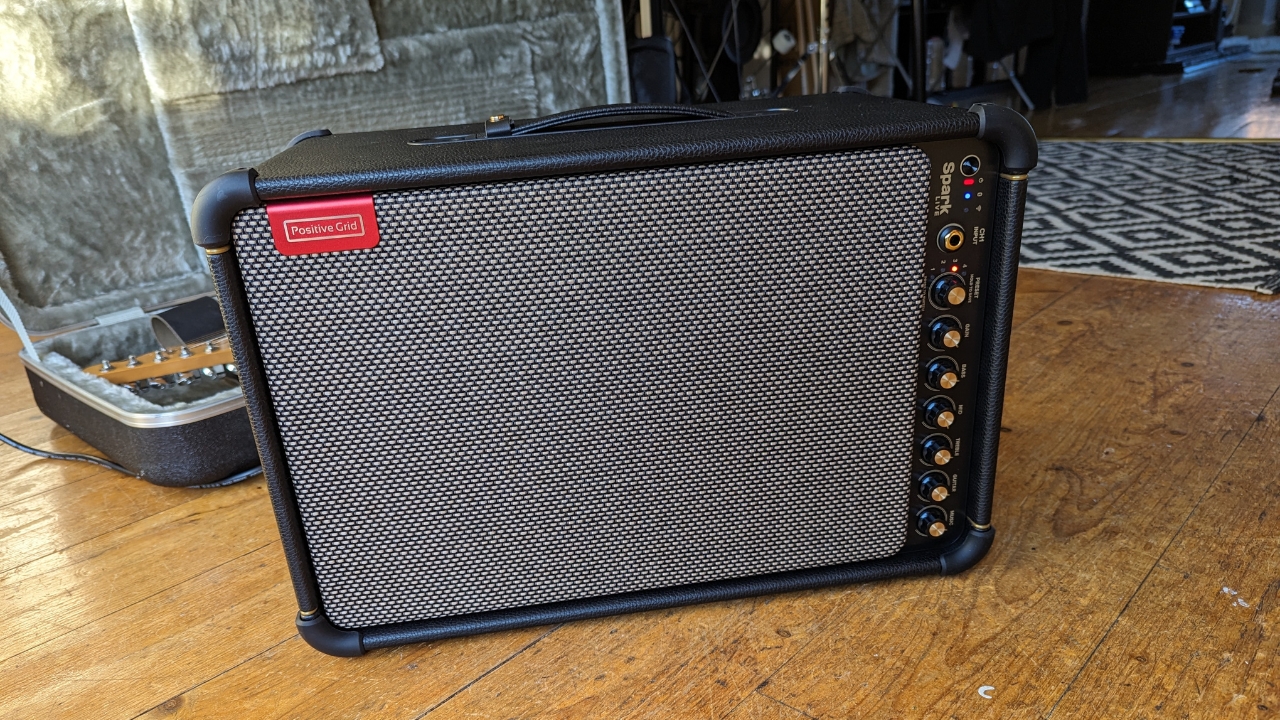MusicRadar Verdict
Way more than just a souped-up Spark 40, the Spark Live can handle bass, vocals, keys, and even electronic drums. It’s a brilliant choice for the busking musician, players who don’t want to cart around multiple amps, or smaller groups of musicians who want the convenience of less gear.
Pros
- +
Incredible sound quality
- +
Four inputs for multiple instruments
- +
Loads of great-sounding presets
- +
Powerful as a Bluetooth speaker
Cons
- -
Didn't quite cut through in the rehearsal room
- -
It’s pretty heavy
MusicRadar's got your back
Price: $499 (Pre-order price)
Output: 150W
Speakers: 2x 6.5-inch
Effects: 40+
Order from: Positive Grid
It's been nearly five years since the Spark 40 was launched, so taken at face value we wouldn’t blame you for thinking the Positive Grid Spark Live is just a bigger, louder version of their preeminent desktop amp. The aesthetic is similar, and as a guitar amp, it does everything the other Spark amps do, just at a much louder volume. That’d be selling the Spark Live well short of its capabilities though, as it goes far beyond being a tool only for guitarists.
The larger size means more inputs, deeper functionality, and most importantly, enough power to make it usable in a live scenario. The press materials claim that it can handle the majority of duties in a band setup. That could mean vocals and keys, an acoustic duo with vocals, or just a singer-songwriter-type setup for busking.
PG sent us a prototype of the Spark Live so we could get to grips with it before launch, giving us plenty of time to test it to its limits at home, and in a full-band scenario. So how does it hold up against a full drum kit? Is it a great guitar amp? And does it cut the mustard as a Bluetooth speaker? Read on to find out.
Positive Grid Spark Live review: Features & Looks
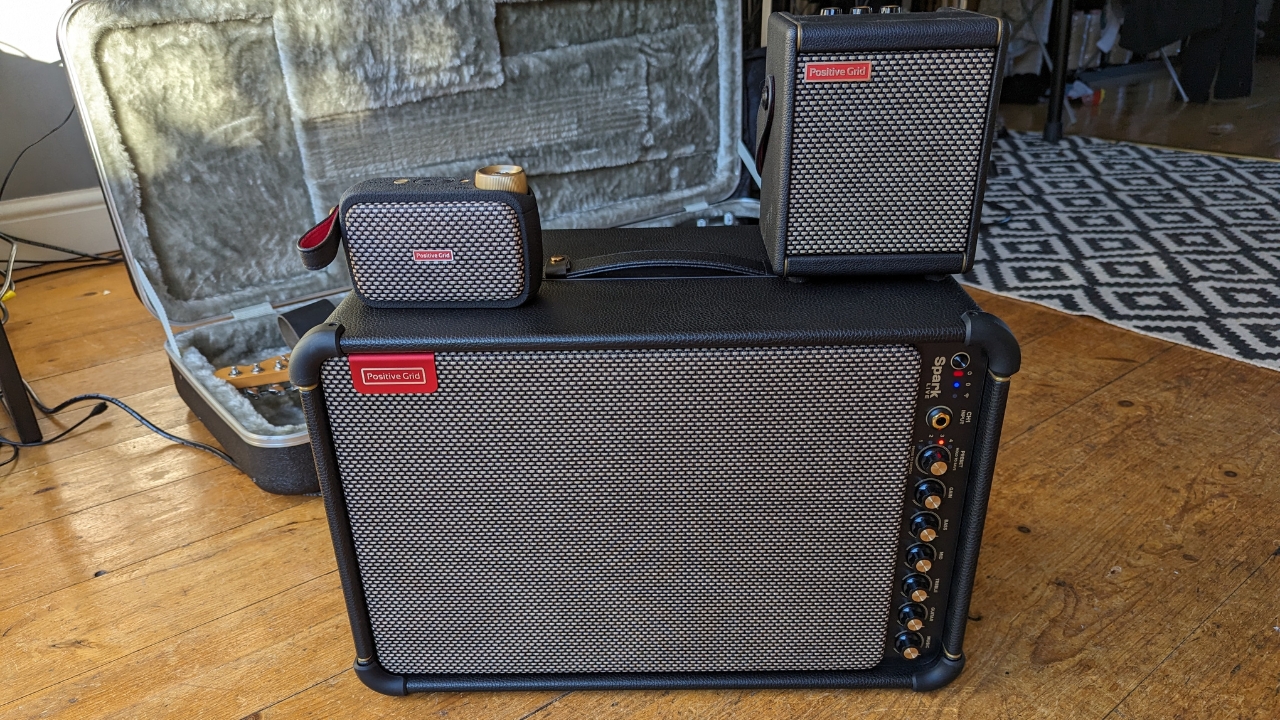
When I unboxed the Spark Live my first impression was how heavy it was. It’s no tube amp of course but it’s hefty and sturdily built. Reminding me of a very good-looking PA speaker the aesthetic is in keeping with the rest of the Spark amp lineup, with the gold and black grille, gold trim, and red PG logo on the front. It certainly fits in with the other amps in the range, so much so that I had to get a family photo of my Spark amps together which you can see above.
Getting down to the details, it has four inputs, three of which are ¼” jacks and one XLR. On the front panel, you’ve got standard fare if you’re used to Spark amp controls, with an input, preset knob, plus controls for gain, bass, mid, treble, and additional controls for balancing the amount of guitar with whichever Bluetooth source you’ve got connected.
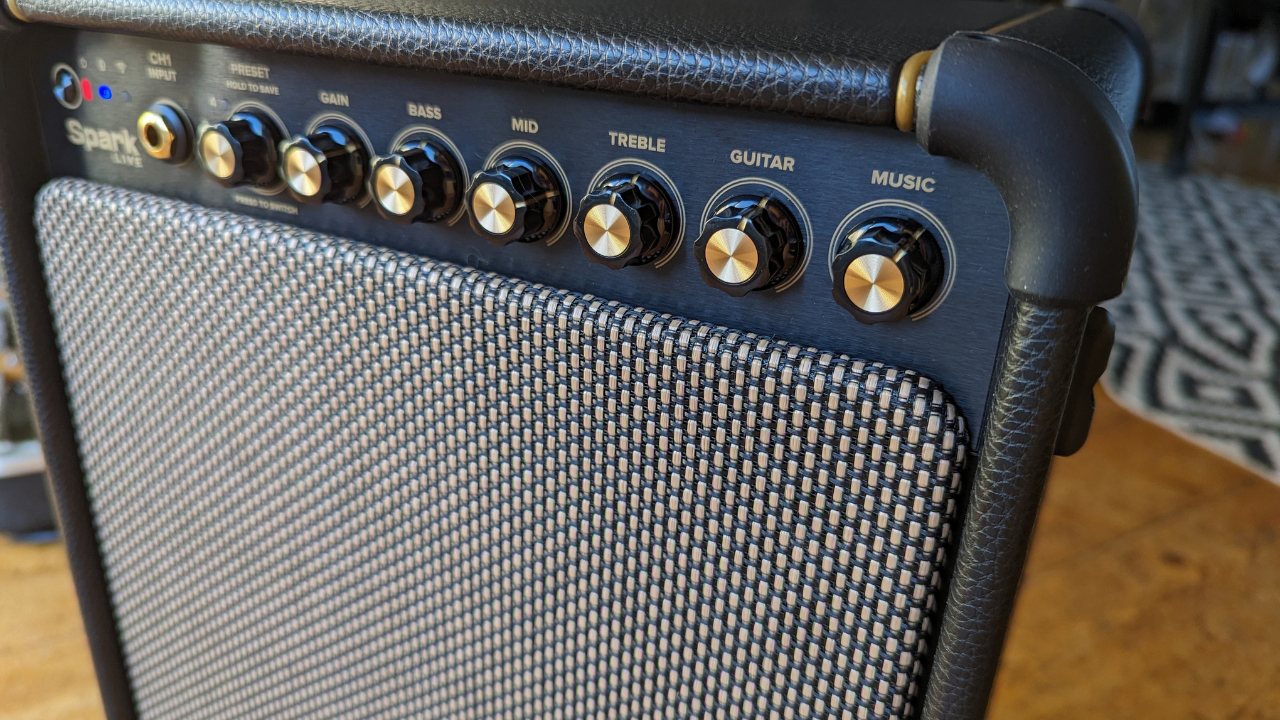
On the reverse side, things look a lot more like a PA speaker, with channel 2 featuring an XLR input with dedicated preset and volume knobs. The master controls are here too, with low, mid, high, and volume controls for tweaking the sound as a whole. Channels 3 and 4 feature a single volume control knob and can be used as a stereo input too. There’s a kickstand for tilting the amp so it faces you when you’re playing, as well as an additional handle for carrying it vertically, and a battery compartment for running the rechargeable battery (sold separately), giving you the option to run the amp wirelessly.

The Spark Live is clever enough to operate on two planes differently, so when positioned vertically like a PA speaker, an internal G-sensor will default it to sending you a mono signal. Place it horizontally like a traditional amp, and you’ll get stereo performance. Under the grill, two 6.5-inch speakers with dedicated 1-inch tweeters and two reflex ports combine to give your tones the utmost clarity, whether that’s guitar, vocals, bass, keys, or as we’ll find out, even electronic drum kits.
Want all the hottest music and gear news, reviews, deals, features and more, direct to your inbox? Sign up here.
Positive Grid Spark Live review: Performance

Plugging the Spark Live in and laying it out in horizontal mode, I start with the thing I know best in my trusty Telecaster and selecting a clean guitar amp via the Spark app. It sounds massive, with the speakers delivering an open and even response with chords and licks alike. The detail is amazing compared with the smaller amp models and once the overzealous gate pedal is removed from the chain, the dynamic range is simply fantastic.
The modelled guitar amps will be familiar to anyone who’s used a Spark amp before covering the gamut of pristine clean right through to heavy gain. Having 150 watts of power on tap totally transforms these tones though, giving you that proper amp experience like you’ve never heard before. Viewed purely as a guitar amp, the Spark Live is fantastic. But wait, there’s more!
Next up I plugged my Jaguar bass into it to see how it handles the lows, and boy can this thing rumble. The low-end is girthy with plenty of sub-depth activity, really incredible considering the size. While to my ear it has a slightly detached feeling - presumably due to the various enhancements going on inside - your average listener is not likely to hear anything other than really well-defined bass tones.
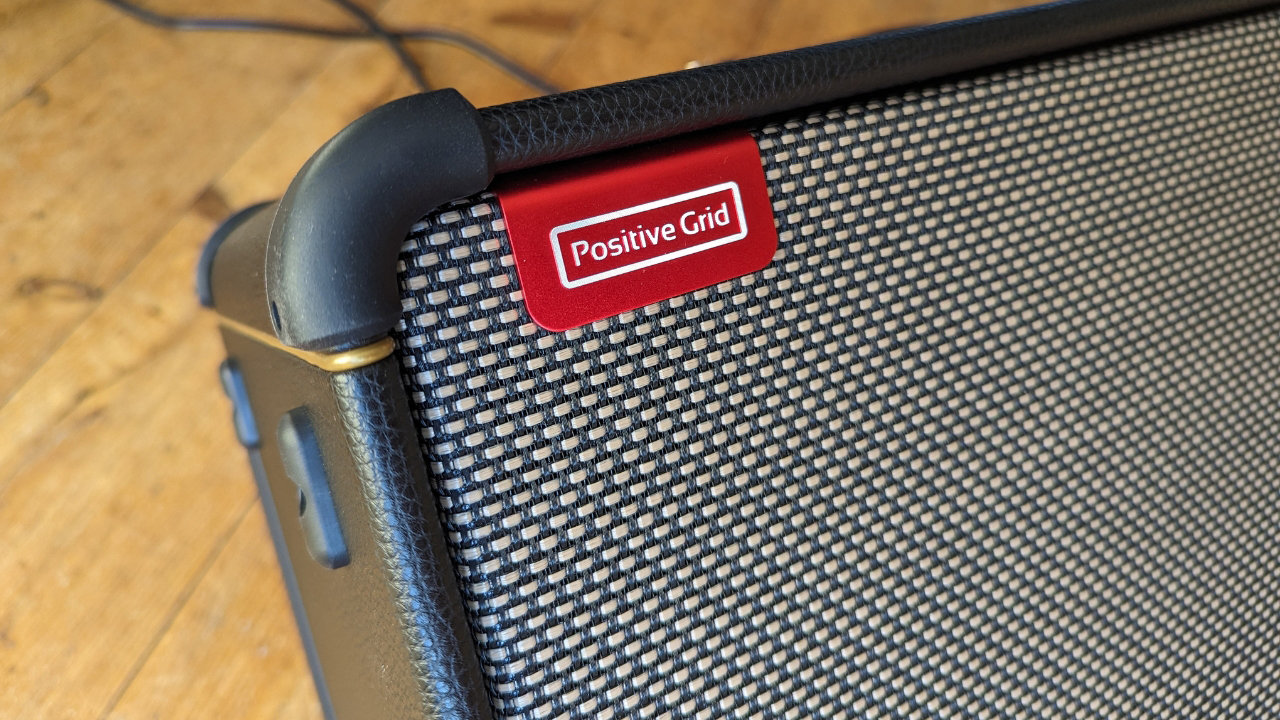
It doesn’t stop there though, this time it was my Roland electronic drum kit getting plugged into channels 3 and 4 to see how the Spark Live handled some percussion. Once again the low end was properly thumping, giving a nice feel for the kick drum. The snare was snappy and articulate, and the cymbals had plenty of shine to them. The idea that you could jam guitar, bass, vocals, and e-drums all through one amp is kind of amazing. While you probably wouldn’t want to use it this way live, I could see it being a useful solution for practicing as a group when you don’t have a rehearsal space available.
With my home testing done, next it was off to the rehearsal space to see how it faired going against ‘proper’ instruments. Bypassing my alt-metal band’s tired old PA system I opted to use the Spark Live as a stand-in PA for vocals. On the floor with the kickstand engaged, it struggled to match the power of a full drum kit, 4x12 bass cab, and cranked tube amp. Even with it cranked to feedback-inducing levels it just didn’t quite cut across the raucous noise we generate. Placed on a PA speaker stand using the built-in mount it fared much better however, providing a clearer sound for the vocals to cut through our dense mix.
Having vocal-specific effects to add into the mix is a nice touch too, although changing them on the fly is a little clunky with just the app. There’s a preset button that enables you to store eight presets each on channels 1 and 2, which is super handy if you don’t want to have to pick up your smartphone constantly.

The mix view in the app is a new feature, which allows you to individually control each input. You can change whether the input is receiving a Hi-Z or a line-level signal, as well as control the volumes of each channel independently, and that of any streamed music. For the first time, the Spark app also features vocal-specific presets, which include a mic pre, compressors, plus all the usual delay and reverbs. You can even add gain pedals to the chain if you want a grittier sound.
For the final test, I opted to play some music through Spark Live to see how it handles lots of sub-depth bass and more complex arrangements. I start with my favorite bass tester track, Lil Wayne’s ‘A Milli’ and the bass response is astonishingly good. I can feel the floor moving at higher levels, but it always sounds high-definition and never flabby. Next up is Radiohead’s ‘Paranoid Android’, which offers excellent insight into multi-part arrangements. You can hear everything clearly, with all the multi-layers of guitars, percussion, and organs easily discernible.
Positive Grid Spark Live review: Verdict
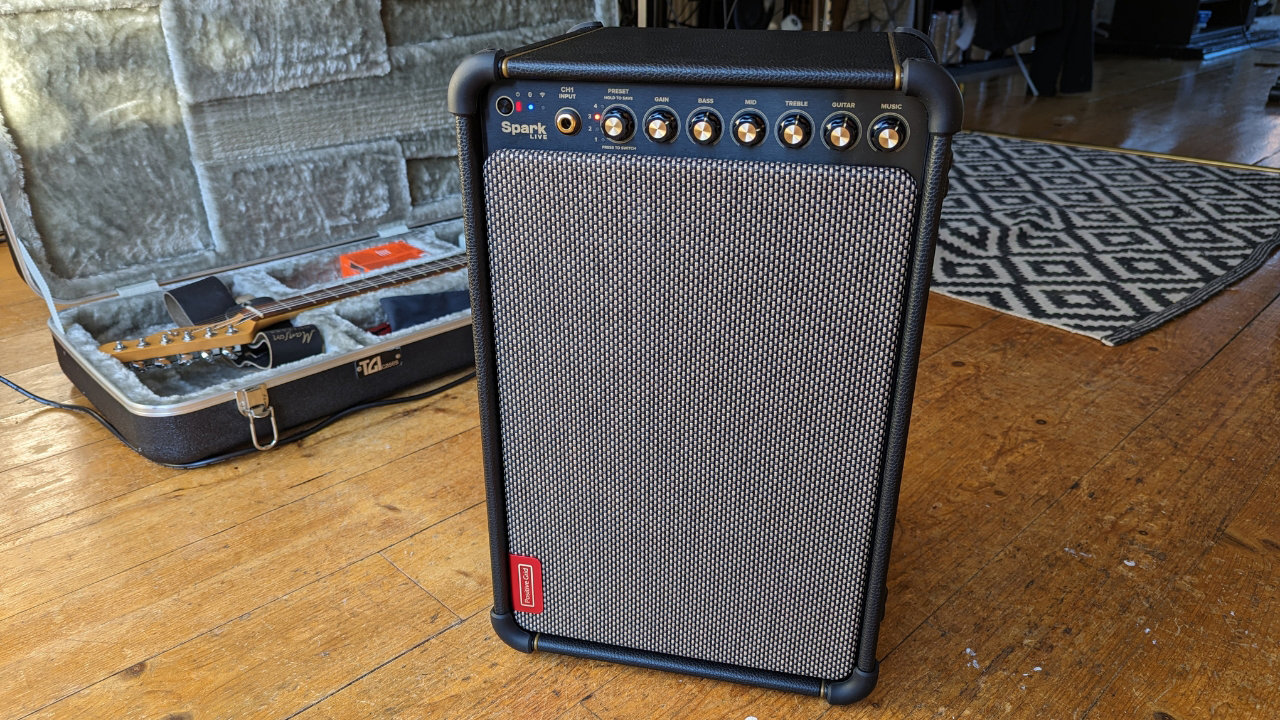
If you want an amplifier that can play multiple roles, the Spark Live is a fantastic choice. It’s got plenty of power for guitarists, bassists, and keys players to use live, and even works as a fantastic-sounding electronic drum monitor. For smaller groups, it can also hold its own for acoustic duos, and busking solo musicians, as well as working great as a practice solution for full bands at lower volumes. A truly versatile bit of kit that also makes an amazing Bluetooth speaker.
Positive Grid Spark Live review: Specs
- PRICE: $499
- TYPE: 4-channel smart amp and PA system
- OUTPUT: 150 watts
- SPEAKERS: 2x 6-inch FRFR
- CONTROLS: Front panel: preset, gain, bass, mid, treble, guitar, music. Rear panel: Master: Low, mid, high, volume. Channel 2: Preset, volume. Channel ¾: volume
- ONBOARD EFFECTS: Yes
- SOCKETS: 3x ¼” in, 1x XLR in, MIDI In, MIDI Out, 2x ¼” out
- WEIGHT: 12 kg (26.45 lb)
- BUY AT: Positive Grid

Matt is a Junior Deals Writer here at MusicRadar. He regularly tests and reviews music gear with a focus on audio interfaces, studio headphones, studio monitors, and pretty much anything else recording-related. Matt worked in music retail for 5 years at Dawsons Music and Northwest Guitars and has written for various music sites, including Guitar World, Guitar Player, Guitar.com, Ultimate Guitar, and Thomann’s t.blog. A regularly gigging guitarist with over 20 years of experience playing live and producing bands, he's also an alumnus of Spirit Studios, where he studied studio engineering and music production. When not writing for MusicRadar, you'll find him making a racket with northern noise punks Never Better.
